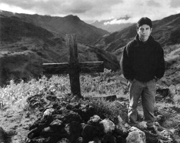
Filmmaker and instructor Mary Ellen Davis

Mateo Pablo, in Haunted Land.
|
by James Martin
The title of Mary Ellen Davis’ new documentary, Haunted Land,
is chillingly apt. Between 1960 and 1996, over 200,000 Guatemalans were
killed or disappeared during government-sanctioned massacres. The dead
were unceremoniously discarded in clandestine graves. Guatemala has many
ghosts.
Mateo Pablo, a Chuj Maya Indian, was 24 years old when state troops slaughtered
the people of his small farming village in 1982. Most of his family was
murdered, but he escaped, eventually settling in Montreal. Haunted
Land recounts his return, 18 years later, to his shattered homeland.
Mary Ellen Davis, an instructor in film production at Concordia’s
Mel Hoppenheim School of Cinema, has “a long-term interest in Latin
America in general, and Central America in particular.” She has visited
Guatemala annually since 1986, and Haunted Land is her third documentary
filmed there. (In addition to her Guatemala films, The Devil’s
Dream and Sacred Earth, Davis directed a documentary titled
Mexico, Dead or Alive.)
Subjective experiences
Davis is active with Projet Accompagnement, a local volunteer organization
that provides people returning to distressed homelands with an international
observer “to help ease tensions,” and it was through these connections
that she first met Pablo. He had seen Mexico, Dead or Alive, in
which Davis accompanied Dr. Mario Rojas Alba, a political exile, back
to Mexico, and suggested doing a similar project based around his planned
returned to Guatemala.
“I try to film the subjective experience of individuals,” said
Davis, explaining what drew her to Pablo’s story. “My films
are not strictly about political or historical affairs — it’s
like doing a fiction film, rather than going through the macro vision
of history.”
Shooting digital-video on a shoestring budget, Davis followed Mateo Pablo
and Sarah Baillargeon (a Projet Accompagnement volunteer) from Montreal
to Guatemala City. After meeting up with photographer Daniel Hernández-Salazar
(perhaps best-known for his iconic portrait of Guatemala’s “angel”
— a man posed in front of “wings” made from a massacre
victim’s bleached shoulder-blades), the team climbed to Pablo’s
former home high in the mountains.
Haunted Land is not an easy film to watch — in one particularly
powerful scene, Pablo identifies his family’s remains lying in an
unmarked mass grave — nor was it an easy film to make. Davis was
unable to secure interest from a TV broadcaster (the key to obtaining
substantial funding in Canada) because, as she was repeatedly informed,
Mateo Pablo’s story was “not compelling” or “not Canadian
enough.”
As a result, the director was left to seek alternative avenues of funding,
forcing her to complete the film in fits and starts over several years.
“I really question why Canada — especially the television broadcasters,
with their huge funding — wouldn’t think that a project about
one of our immigrant’s life experiences is worth sharing with other
Canadians,” she said. “I find that very strange.”
Commitment to persecute
needed
Haunted Land may be finished at long last, but Mateo Pablo’s
quest for justice continues. He and Davis are circulating a petition demanding
the Canadian government strengthen its commitment to the persecution of
international war criminals. He also hopes to spread his story by touring
with the film, with plans underway to visit Western Canada in the spring.
Davis is already working on her next documentary, a film about Larry Towell,
the Ontario photographer celebrated for his photos of life in countries
such as Mexico, Palestine and El Salvador.
“We’ll see if Canadian TV is more enthusiastic about this story,”
she quipped, still smarting from the frustration of bringing Haunted
Land to the screen. She added with a wry laugh, “A lot of Larry
Towell’s photographs are taken outside of Canada, so we’ll see.”
Haunted Land will be screened on Friday, January 25, in the Henry
F. Hall Building, H-110. The French version, Le Pays Hanté, runs
until January 31 at Ex-Centris.
|
|
|



